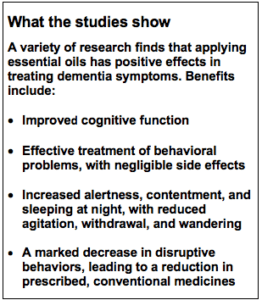When a person first moves from home to a senior care setting or transitions from one community to another, the change can feel overwhelming. For some seniors, change brings fear and anxiety, and for residents living with dementia, it can trigger agitation and aggression.
Many providers are searching for safe, nonpharmacological approaches to alleviating psychological discomfort for their residents. In senior living communities throughout the world, the practice of aromatherapy is gaining ground – not only for reducing stress but for treating some of the symptoms of dementia. Aromatherapy uses essential oils from plants to address health challenges, improve clinical outcomes, and support overall wellness. Respected health care experts, from the Mayo Clinic to the Alzheimer’s Association, have cited aromatherapy as a legitimate form of alternative therapy.

Mitigating Stress
“New residents in senior living communities need time to transition and to adjust to an unfamiliar environment,” says Susan McKinney, Vice President of Operations at Lifetime Wellness. “They may be under tremendous stress, having lost a spouse, for example, or having been diagnosed with a serious medical condition. Stress can show up as a range of troubling emotions, from anxiety to depression.”
Lifetime Wellness, a leading provider of person-centered wellness, life enrichment, and recreational programs, offers an Aroma Works program to senior care communities seeking a nonpharma option for addressing the emotional difficulties and behavioral challenges of those in their care. The program works with clinicians as an interdisciplinary team to identify resident needs, determining which oils are best suited for each individual and how to use them safely and effectively. Essential oils for anxiety, depressions, and more are applied through inhalation with a diffuser or topically through a prediluted roll-on that is safe for sensitive skin.
“Different oils work differently on everyone, so an individual approach is essential,” McKinney says. “Knowing the resident’s life story can help providers create a person-centered care plan that includes aromatherapy.”
Managing Dementia
According to the Mayo Clinic, aromatherapy in memory care works by stimulating smell receptors in the nose, sending messages through the nervous system to the limbic system – the part of the brain that controls emotion, behavior, and long-term memory. Pleasant aromas can elevate mood, curtail negative behaviors, and reawaken happy memories.
Since the 1990s, researchers have studied the outcomes of aromatherapy in people with dementia, including overall impact as well as the effect of specific oils on specific symptoms. Studies show that rosemary, for example, can improve cognitive performance. Peppermint and jasmine, too, can enhance brain function and focus. Lavender and lemon balm have been found to soothe and to suppress combativeness and wandering, symptoms common in dementia. These oils can also improve sleep patterns, increase daytime alertness, and stimulate communication.
 Lavender is particularly effective in reducing agitation, a behavior a person with dementia may express through shouting or screaming. A resident at a Lifetime Wellness partner community, for example, repeatedly “called out.” After consulting with the resident’s family, the care team began regular aromatherapy treatments.
Lavender is particularly effective in reducing agitation, a behavior a person with dementia may express through shouting or screaming. A resident at a Lifetime Wellness partner community, for example, repeatedly “called out.” After consulting with the resident’s family, the care team began regular aromatherapy treatments.
“Day by day, the family noticed their loved one growing calmer, with fewer outbursts and more eye contact,” McKinney says. “The family was reassured that mom was being cared for in a safe, supportive, and effective way.”
Modeling the Future of Care
As the health care system becomes increasingly patient-centered and more open to complementary and alternative medicine, the use of aromatherapy among senior care providers is poised to surge. Such programs can achieve results with less medication and less expense, without the dangerous side effects of many drugs.
“Senior care providers can easily integrate aromatherapy into their staff protocols and residents’ day-to-day lives,” McKinney says. “It’s a promising addition to therapeutic interventions – bringing relief to residents, offering assurance to loved ones, and improving quality of care overall.”